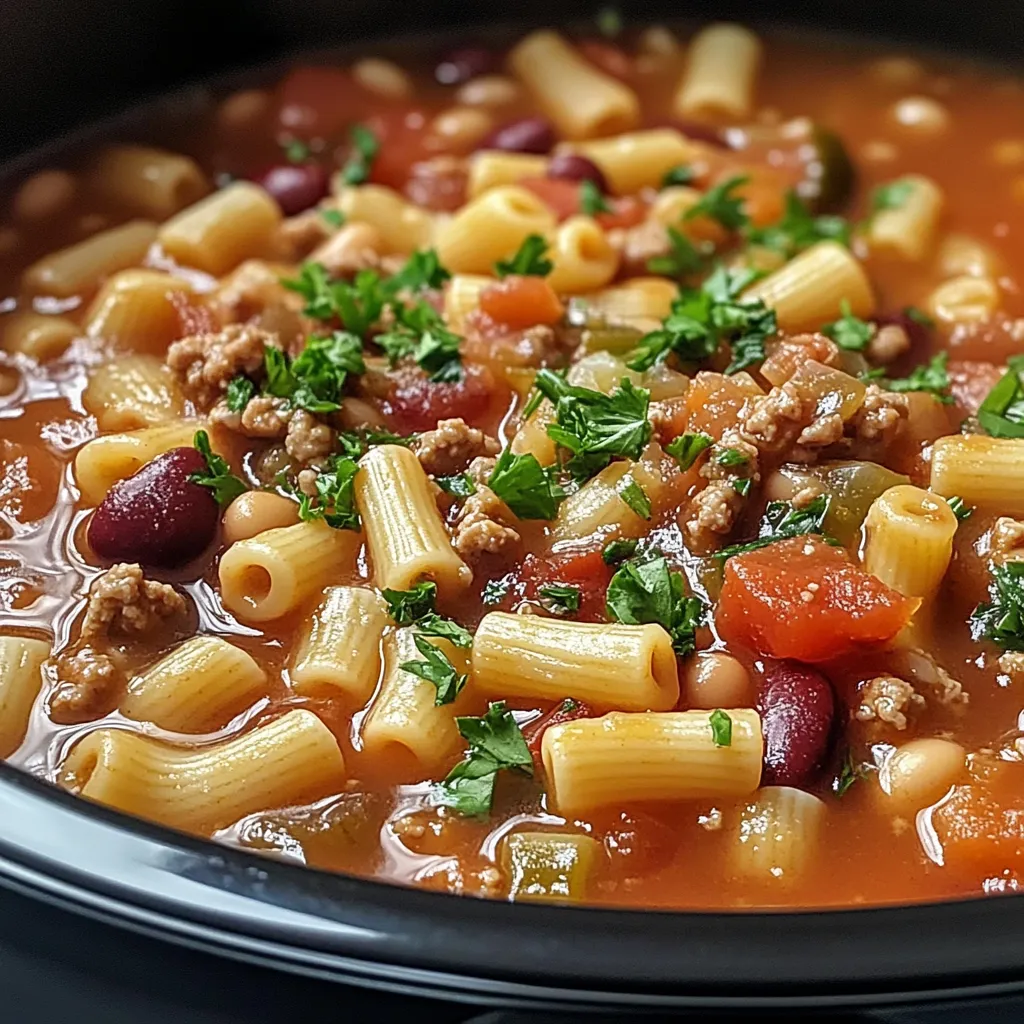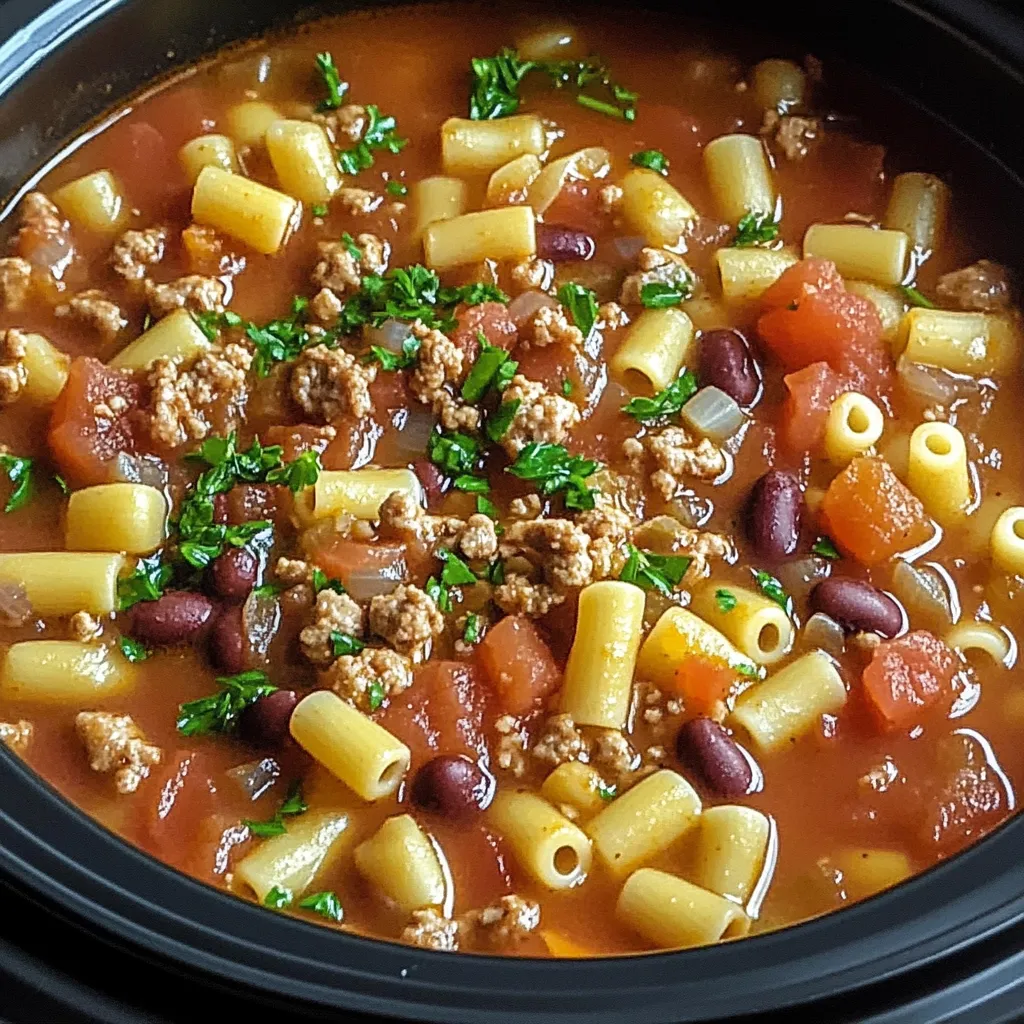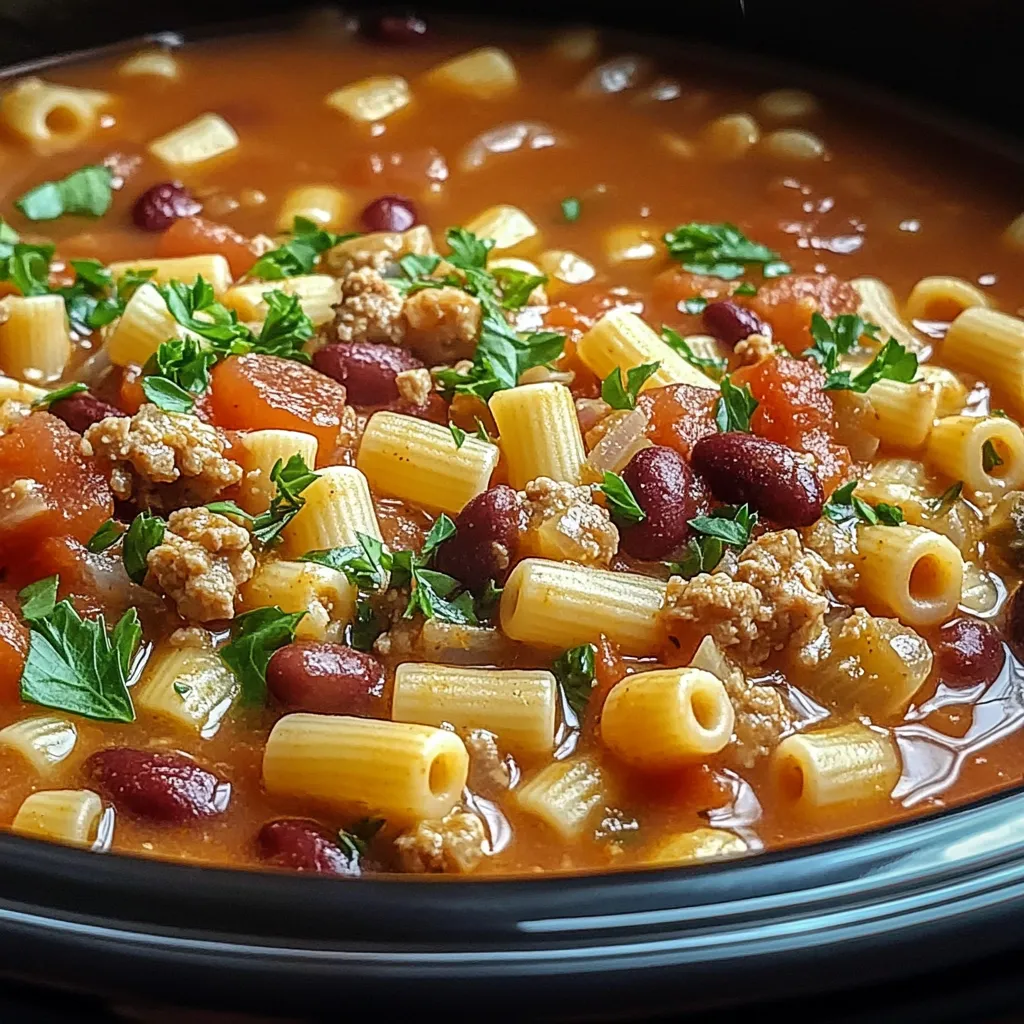 Save
Save
Rustic Italian comfort fills each spoonful of this traditional bean and pasta soup that balances simplicity with remarkable depth of flavor. The humble combination of tender cannellini beans and perfectly cooked small pasta creates substantial texture in a savory broth infused with aromatic vegetables and herbs. This peasant-inspired dish demonstrates how straightforward ingredients transform into something extraordinary when prepared with care and attention to detail.
Last winter during a particularly cold spell, I prepared this soup when my Italian grandmother visited. She watched silently as I chopped vegetables and stirred the pot, then took her first spoonful with a critical eye. Her smile and nod of approval told me everything—I had managed to capture the essence of this traditional dish that had nourished our family for generations. Something about the combination of beans and pasta in flavorful broth seems to speak a universal language of comfort.
Essential Components
- Olive Oil: Creates the aromatic foundation for authentic flavor. Extra virgin varieties offer superior taste with their fruity undertones and peppery finish.
- Onions, Carrots, and Celery: Form the classic soffritto base that permeates Italian cooking. These aromatic vegetables provide essential depth when properly sautéed.
- Fresh Garlic: Infuses the broth with distinctive aromatic character. Mincing just before adding ensures maximum flavor release compared to pre-prepared options.
- Vegetable Broth: Provides the liquid foundation with balanced savory notes. Homemade delivers superior flavor, though quality store-bought creates excellent results.
- Diced Tomatoes: Add brightness and acidity that balance the earthiness of beans. San Marzano varieties offer exceptional sweetness and minimal acidity.
- Cannellini Beans: Contribute creamy texture and substantial protein. These Italian white beans hold their shape while becoming tender in the broth.
- Ditalini Pasta: Creates perfect bite-sized pieces that complement the beans. This small tubular pasta absorbs flavor while maintaining texture.
- Dried Herbs: Deliver authentic Italian flavor profile throughout. Oregano and thyme provide aromatic complexity that defines the soup's character.
- Fresh Parsley: Brightens the finished soup with herbaceous freshness. This final addition provides both visual appeal and flavor contrast.
Preparation Method
Aromatic Foundation
Heat olive oil in a large, heavy-bottomed pot over medium heat until shimmering but not smoking. Add finely diced onion, carrots, and celery, stirring occasionally until vegetables soften and begin to release their aromatic qualities, approximately 5-7 minutes. This slow cooking develops sweet undertones that permeate the entire soup.
Garlic Incorporation
Add minced garlic to the softened vegetables, stirring continuously for about one minute until fragrant but not browned. This brief cooking mellows garlic's sharp bite while preserving its essential oils that infuse the broth. Careful timing prevents bitterness from overcooked garlic.
Liquid Development
Pour vegetable broth into the pot, using a wooden spoon to scrape any flavorful bits from the bottom. Add diced tomatoes with their juice, bringing additional depth and slight acidity. This combination creates the perfect liquid base that will eventually unite all components.
Bean Integration
Add drained and rinsed cannellini beans to the simmering broth, allowing their starchy quality to begin thickening the soup naturally. Some recipes call for partially mashing a portion of beans, which creates additional creaminess throughout the broth while maintaining whole beans for textural contrast.
Herb Infusion
Sprinkle dried oregano and thyme into the soup, crushing slightly between your fingers to release their essential oils. These Mediterranean herbs provide the distinctive aromatic profile that defines authentic Italian soup. Allow them to bloom in the hot liquid before proceeding.
Pasta Addition
Once the broth is fully flavored, add dry ditalini pasta directly to the simmering soup, stirring occasionally to prevent sticking. Cook until the pasta is tender but still maintains slight resistance when bitten—approximately 8-10 minutes. This al dente texture ensures the pasta won't become mushy as the soup rests.
Final Seasoning
Taste the soup carefully, adjusting with salt and freshly ground black pepper as needed. The beans and pasta absorb salt, so proper seasoning at this stage is crucial for balanced flavor. A small splash of additional olive oil stirred in just before serving adds remarkable richness.
Finishing Touch
Remove from heat and allow to rest briefly before serving. Ladle into warmed bowls and garnish with freshly chopped parsley and a light drizzle of high-quality olive oil. This final enhancement adds brightness that complements the soup's depth.
 Save
Save
My grandmother always insisted on adding a parmesan rind to the simmering broth, explaining that this seemingly insignificant addition contributed remarkable depth. The first time I made this soup without her guidance, I forgot this step and immediately noticed something missing in the final flavor. Now I keep a container of parmesan rinds in my freezer specifically for soups, knowing this small detail transforms good soup into exceptional soup.
Serving Suggestions
This hearty soup creates beautiful harmony with simple accompaniments that complement without competing. Serve alongside crusty Italian bread for dipping into the flavorful broth—ciabatta or a rustic sourdough works perfectly. For a complete meal, pair with a simple arugula salad dressed with lemon and olive oil, offering peppery freshness that contrasts with the soup's rich comfort. A glass of medium-bodied Sangiovese completes the authentic Italian experience.
Regional Variations
This adaptable recipe welcomes numerous interpretations inspired by Italy's diverse culinary traditions. Northern Italian versions often feature borlotti beans and a thicker consistency, sometimes incorporating small amounts of pancetta for depth. Southern interpretations typically include more tomatoes and sometimes greens like escarole or spinach. For additional protein, some regions incorporate small meatballs or sausage, creating a heartier main course version of this humble soup.
Keeping It Fresh
Store leftover soup in airtight containers in the refrigerator for up to five days, noting that it will continue to thicken as the pasta absorbs more liquid. When reheating, add a small amount of broth or water to restore the original consistency. For longer storage, freeze the soup without pasta, as frozen pasta tends to become mushy upon thawing. Simply cook fresh pasta separately and add it to the reheated soup before serving.
 Save
Save
After preparing this Pasta e Fagioli countless times throughout the changing seasons, I've found it represents the perfect balance between nourishing simplicity and satisfying comfort. The combination of humble ingredients creates a dish that feels simultaneously rustic and refined, honoring its peasant origins while delivering sophisticated flavor. Whether served as a starter or main course, this traditional Italian soup consistently provides both physical and emotional nourishment.
Common Questions About Cooking
- → What does 'Pasta e Fagioli' mean?
- Pasta e Fagioli (pronounced 'pasta eh fah-JOE-lee') literally means 'pasta and beans' in Italian. It's a traditional Italian soup that originated as a peasant dish, making use of inexpensive ingredients. Regional variations exist throughout Italy, but it always includes pasta and beans as the main components, typically cooked in a broth with vegetables and sometimes meat.
- → Can I use a different type of bean?
- Absolutely! While cannellini beans (white kidney beans) are traditional, you can substitute with great northern beans, navy beans, or even red kidney beans. Each will give a slightly different flavor and texture. For extra richness, you can use a mixture of different beans. Just make sure to rinse and drain canned beans well to remove excess sodium.
- → What's the best pasta shape to use?
- Traditional Pasta e Fagioli uses small pasta shapes that are similar in size to the beans. Ditalini is most common, but you can also use small shells, elbow macaroni, orzo, or even broken spaghetti. If using larger pasta shapes, you may need to adjust the cooking time slightly. For a gluten-free version, simply substitute with your favorite gluten-free pasta.
- → How do I store leftovers?
- This soup stores well in the refrigerator for 3-4 days in an airtight container. Keep in mind that the pasta will continue to absorb liquid as it sits, so the soup will thicken considerably. When reheating, you may need to add additional broth or water to reach your desired consistency. If planning to freeze, it's best to cook the soup without pasta, freeze it, then add freshly cooked pasta when reheating.
- → How can I make this soup more substantial?
- To make this soup heartier, you can brown 1/2 pound of Italian sausage, ground beef, or pancetta at the beginning, before adding the vegetables. For a vegetarian option that's still protein-rich, add another can of beans or some cubed firm tofu. You can also increase the vegetables by adding zucchini, bell peppers, or spinach. For extra flavor, top each serving with freshly grated Parmesan cheese and a drizzle of olive oil.
